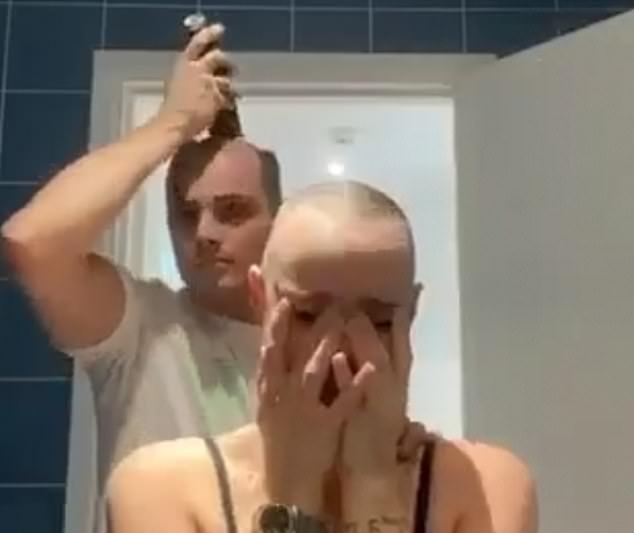
Scripture repeatedly depicts the relationship between God and his people as that between a bridegroom and his bride. In such a relationship, the lovers devote their lives to each other, sharing in each other’s joy and grief. It’s the perfect analogy, especially when God takes human form as Christ to make that sharing complete. Through Jesus, God the Father takes on our mortality in a way that touches our hearts so deeply that we can’t help but adopt God’s empathy for us and share it with others in need of healing and wholeness.
So in that light, as we contemplate the Solemnity of Christ’s ascension, it might be illustrative to watch a video that popped up recently on social media feeds. It shows a man shaving his girlfriend’s head. The woman suffers from an auto-immune disease causing hair loss. She eventually and reluctantly sheds her vanity and asks her man to help her go bald. As she gazes in the mirror and watches him finish the clip job on her, he immediately turns the electric razor on himself and shaves himself bald. This gesture of solidarity and sacrificial love brings her to tears, touching her so deeply that she decides to devote her life to sharing her love with other fellow sufferers.
The ascension connection? Imagine Christ’s disciples. They’ve been with him through thick and thin during his earthly ministry. The Holy Spirit of God performed miracles through him, changing their lives and those of many others. He not only took on our life, but our mortality, as well—in solidarity and sacrifice. But that same Holy Spirit that powered his resurrection from death would also inspire the hope that humanity would share in his ministry as well as in his ascension. In Sunday’s first reading (Acts 1:1-11), he says as much to them—before ascending.
“But you will receive power when the Holy Spirit comes upon you, and you will be my witnesses in Jerusalem, throughout Judea and Samaria, and to the ends of the earth.” When he had said this, as they were looking on, he was lifted up, and a cloud took him from their sight.
As they stared dumbfounded by this vision, that same Holy Spirit gives them a virtual kick in the pants, as if to say, don’t just stand there, DO something.
So they did, as documented in the Acts of the Apostles, from which we get the above account. And as Paul tells the Ephesians in Sunday’s second reading (Eph 4:1-13), those acts inspired the acts of many more holy people, touched by the sacrifices of their beloved so they could replicate them for others.
And he gave some as apostles, others as prophets, others as evangelists, others as pastors and teachers, to equip the holy ones for the work of ministry, for building up the body of Christ, until we all attain to the unity of faith and knowledge of the Son of God, to mature to manhood, to the extent of the full stature of Christ.
Mark promises that outcome in his gospel (Mk 16:15-20):
“They will lay hands on the sick, and they will recover.”
We as a church owe our many recoveries to our beloved spouse, who took on humanity’s lowly appearance, in solidarity with our suffering. We are called to share that legacy by helping others recover from life’s close shaves.
–Tom Andel